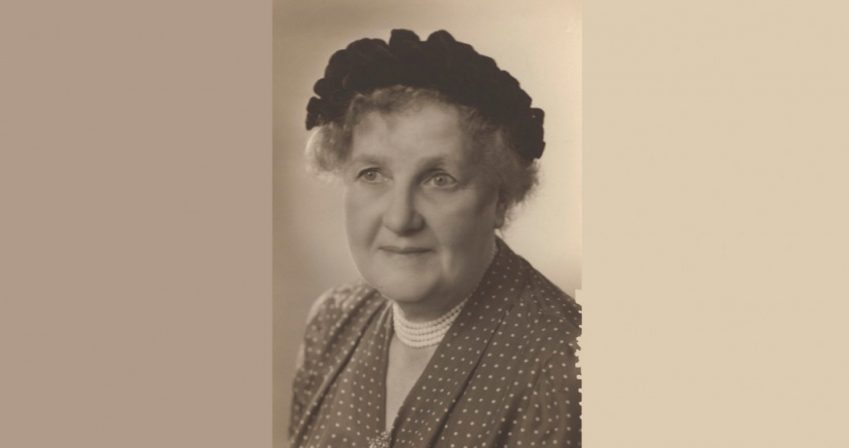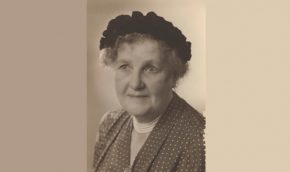Doctor, Lawyer, a War-Worker and the first Female Chief Medical Officer for London
Women in Law
- Introduction
- Timeline
- Joyce Bamford-Addo
- Marion Billson
- Jill Black
- Elizabeth Butler-Sloss
- Sue Carr
- Eugenia Charles
- Lynda Clark
- Freda Corbet
- Coomee Rustom Dantra
- Leeona Dorrian
- Heather Hallett
- Frene Ginwala
- Rosalyn Higgins
- Daw Phar Hmee
- Lim Beng Hong
- Dorothy Knight Dix
- Sara Lawson
- Elizabeth Lane
- Theodora Llewelyn Davies
- Gladys Ramsarran
- Lucy See
- Evelyn Sharp
- Victoria Sharp
- Ingrid Simler
- Teo Soon Kim
- Ivy Williams
- The Significance of the Sex Disqualification (Removal) Act 1919
- Podcasts
Home › Women in Law › Pioneering Women in Law › Letitia Fairfield
Dr Letitia Fairfield CBE
1885 - 1978
Dr Letitia Fairfield’s admission to the bar on 26 January 1923 does not usually feature in descriptions of her trailblazing activities as a physician, suffragette and Lieutenant-Colonial in both world wars. Yet while she never practised as a barrister, she drew upon her legal training at Middle Temple throughout her professional life and retained an enduring interest in the intersections between medico-legal issues and criminology. The law - both as an intellectual discipline and an esteemed, ‘establishment’ profession – remained an essential yet unremarked upon buttresses to her formidable career as a preeminent civil servant and acclaimed women’s health campaigner.
Considering her contributions to the field of public health, her place amongst the very first women called to the Bar in England, and her involvement in some of the most controversial political issues of the century, Letitia Fairfield has received surprisingly little scholarly attention. In contrast to her much-biographed young sister - the novelist Rebecca West who had a child with HG Wells – there is no sustained study of Dr Fairfield’s stellar career at the London County Council, her own forays into print or her reputation as
a formidable opponent on the debating platform in an age when public debate ranked as one of the entertainments of the day.[1]


Dr Letitia Fairfield CBE
Born in Melbourne in 1885 to an Anglo-Irish journalist father and Scottish musician mother, Fairfield excelled in her medical studies at the Edinburgh Medical College for Women and graduated with a MD from the University of Edinburgh in 1911. Upon qualifying, she joined the London County Council as a medical officer for schools, was appointed its first female senior medical officer in 1929, and built a diverse career administering London’s mental hospitals and maternity wards until her retirement in 1948. Her early interest in the law may have been burnished through the women’s movement. Graduate clinical training in Manchester brought her into the orbit of the Pankhursts in 1909 and for the next decade, she combined a hectic administrative caseload with extensive campaigning for suffrage and service on the Executive of the Fabian Society.[2] In the course of this activism, politics and legal reform coalesced in her public oration supporting the suffrage bills, critiquing of national insurance legislation and explaining Home Rule.
Placed in this wider trajectory, perhaps the decision of the thirty four year old Dr Fairfield to apply for admission to the Bar within a fortnight of its opening to women becomes more explicable.[3] She excelled in her Bar exams and on her Call was the first candidate in Class 2 and the highest scoring woman. Already supremely qualified in the medical field, family folklore explains her decision to seek admission as the acquisition of the "right legal basis to be able to tackle MPs … a definite weapon for her LCC [policy] work."[4] Striving to share these tools with fellow physicians, she wrote Medical Practice and the Criminal Law (1926)[5] which surveyed the intersections between both disciplines and drew upon her own experience as an expert medical witness in the Coroner’s Court.[6] Her intimate knowledge of legislative and judicial processes also sustained her lifelong efforts to safeguard women’s equal pay and secure greater concessions around the marriage bar and maternity provision, especially during her tenure as President of the Medical Women’s Federation between 1930-32.
The enduring dialogue between Dr Fairfield medical and legal interests was also manifest in her lifelong involvement in the Medico-Legal Society, contributing papers on widely diverse fields such as juvenile delinquency, suicide, abortion, reproductive issues and homosexuality.[7] She edited the Society’s journal for more than a decade after the Second World War, before assuming the Presidency in 1957 at the impressive age of 72.
In her very active retirement from the civil service, she also returned to an intellectual engagement with criminal law. Bringing together her interests in mental health and the legal defence of insanity, she edited the court transcripts for the infamous Staffen trial involving the murder of four young girls in Berkshire by an escaped inmate of Broadmoor psychiatric hospital. Never one to shirk controversy, her other volume for the Notable Trials series explored the history of Irish nationalism (and drew upon the papers of her friend – and chief prosecutor - Richard O’Sullivan QC KSG) to contextualise the activities of Peter Barnes and his accomplices in the IRA bombing of Coventry in 1939.[8]
Throughout all her activities in public life, Dr Fairfield was sustained by her Christian faith which found a home in the Roman Catholic church following her conversion in 1923. Convinced of the enduring Judeo-Christian foundations of the common law, she summed up her jurisprudential understanding in a typically wide-ranging Presidential address to the Medico-Legal Society which concluded:
the justice of a cause is no protection against the perpetration of appalling injustice if the principles of justice itself are forgotten … the machinery of justice [is only served] … if Truth herself, vigorous and inviolate, presides over the proceedings.[9]
This vigorous and impartial commitment to the ‘machinery of justice’, as well as her Thomistic belief in the moral adjudication of both the ‘ends’ and the ‘means’ was brought to her public service and activism. Known contemporaneously as ‘London’s doctor’, she also warrants long overdue, posthumous acknowledgment as one of the most distinguished amongst those first women lawyers called to the Bar.
Dr Alana Harris
Senior Lecturer in Modern British History, King’s College London
[1] Obituary’, The Universe, 10 February 1978, 21.
[2] M. A. Elston, ‘Fairfield, (Josephine) Letitia Denny (1885-1978)’, Oxford Dictionary of National Biography (Oxford University Press, 2004), http://www.oxforddnb.com/abstract/10.1093/ref:odnb/9780198614128.001.0001/odnb-9780198614128-e-54196?rskey=EYI8GT&result=1.
[3] Admission Papers, Middle Temple (MT). 3/AHC/28. Her admission form was processed on January 13, 1920.
[4] Emily Garrett, ‘Josephine Letitia Denny Fairfield (1885-1978): Pushing the Boundaries of Medicine’, Journal of Medical Biography 22, no. 4 (2014): 239.
[5] Letitia Fairfield, Medical Practice and the Criminal Law (London: Medical Women’s Federation, 1926), see Wellcome Trust, SA/MWF/B.4/2/3.
[6] See ‘Coroner’s Court Witness; A “Moral Defective”’, Gloucester Citizen, 20 January 1928, 3 and Letitia Fairfield, ‘Women Mental Defectives and Crime: A Practical Study’, Transactions of the Medico-Legal Society XXV (1931): 1-24, 3, 19.
[7] Alana Harris, ‘“Lady Doctor among the Called”: Dr Letitia Fairfield and Catholic medico-legal activism beyond the bar’, Women’s History Review (December 2019 forthcoming).
[8] The Trial of Peter Barnes and Others. The I.R.A. Coventry explosion of 1939, ed. Letitia Fairfield (London: William Hodge & Co, 1953).
[9] Letitia Fairfield, ‘Presidential Address: The Problem of Confessions’, Medico-Legal Journal, XXV no. 4 (1957): 142-8.